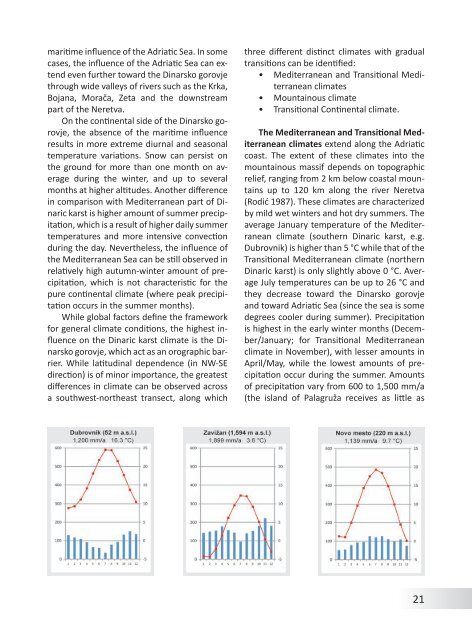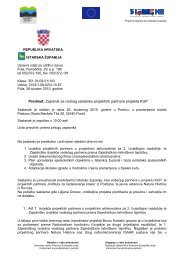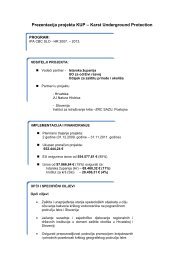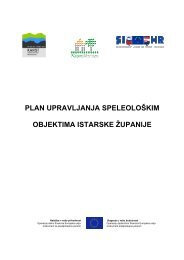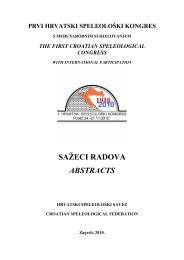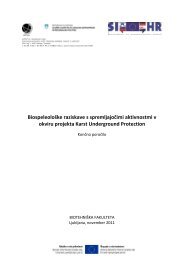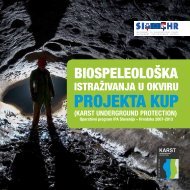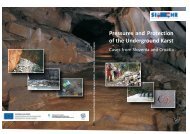Case Studies from the Dinaric Karst of Slovenia
Case Studies from the Dinaric Karst of Slovenia
Case Studies from the Dinaric Karst of Slovenia
You also want an ePaper? Increase the reach of your titles
YUMPU automatically turns print PDFs into web optimized ePapers that Google loves.
maritime influence <strong>of</strong> <strong>the</strong> Adriatic Sea. In somecases, <strong>the</strong> influence <strong>of</strong> <strong>the</strong> Adriatic Sea can extendeven fur<strong>the</strong>r toward <strong>the</strong> Dinarsko gorovjethrough wide valleys <strong>of</strong> rivers such as <strong>the</strong> Krka,Bojana, Morača, Zeta and <strong>the</strong> downstreampart <strong>of</strong> <strong>the</strong> Neretva.On <strong>the</strong> continental side <strong>of</strong> <strong>the</strong> Dinarsko gorovje,<strong>the</strong> absence <strong>of</strong> <strong>the</strong> maritime influenceresults in more extreme diurnal and seasonaltemperature variations. Snow can persist on<strong>the</strong> ground for more than one month on averageduring <strong>the</strong> winter, and up to severalmonths at higher altitudes. Ano<strong>the</strong>r differencein comparison with Mediterranean part <strong>of</strong> <strong>Dinaric</strong>karst is higher amount <strong>of</strong> summer precipitation,which is a result <strong>of</strong> higher daily summertemperatures and more intensive convectionduring <strong>the</strong> day. Never<strong>the</strong>less, <strong>the</strong> influence <strong>of</strong><strong>the</strong> Mediterranean Sea can be still observed inrelatively high autumn-winter amount <strong>of</strong> precipitation,which is not characteristic for <strong>the</strong>pure continental climate (where peak precipitationoccurs in <strong>the</strong> summer months).While global factors define <strong>the</strong> frameworkfor general climate conditions, <strong>the</strong> highest influenceon <strong>the</strong> <strong>Dinaric</strong> karst climate is <strong>the</strong> Dinarskogorovje, which act as an orographic barrier.While latitudinal dependence (in NW-SEdirection) is <strong>of</strong> minor importance, <strong>the</strong> greatestdifferences in climate can be observed acrossa southwest-nor<strong>the</strong>ast transect, along whichthree different distinct climates with gradualtransitions can be identified:• Mediterranean and Transitional Mediterraneanclimates• Mountainous climate• Transitional Continental climate.The Mediterranean and Transitional Mediterraneanclimates extend along <strong>the</strong> Adriaticcoast. The extent <strong>of</strong> <strong>the</strong>se climates into <strong>the</strong>mountainous massif depends on topographicrelief, ranging <strong>from</strong> 2 km below coastal mountainsup to 120 km along <strong>the</strong> river Neretva(Rodić 1987). These climates are characterizedby mild wet winters and hot dry summers. Theaverage January temperature <strong>of</strong> <strong>the</strong> Mediterraneanclimate (sou<strong>the</strong>rn <strong>Dinaric</strong> karst, e.g.Dubrovnik) is higher than 5 °C while that <strong>of</strong> <strong>the</strong>Transitional Mediterranean climate (nor<strong>the</strong>rn<strong>Dinaric</strong> karst) is only slightly above 0 °C. AverageJuly temperatures can be up to 26 °C and<strong>the</strong>y decrease toward <strong>the</strong> Dinarsko gorovjeand toward Adriatic Sea (since <strong>the</strong> sea is somedegrees cooler during summer). Precipitationis highest in <strong>the</strong> early winter months (December/January;for Transitional Mediterraneanclimate in November), with lesser amounts inApril/May, while <strong>the</strong> lowest amounts <strong>of</strong> precipitationoccur during <strong>the</strong> summer. Amounts<strong>of</strong> precipitation vary <strong>from</strong> 600 to 1,500 mm/a(<strong>the</strong> island <strong>of</strong> Palagruža receives as little as21


